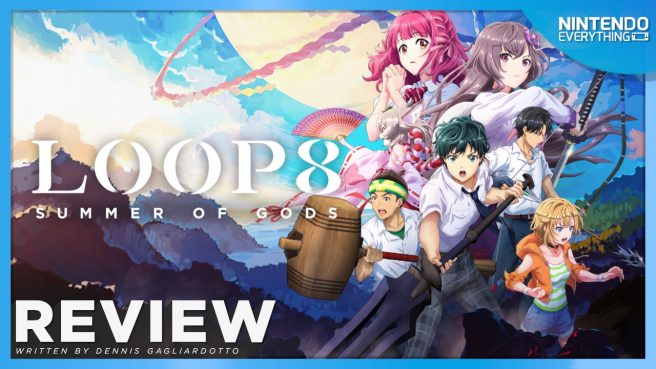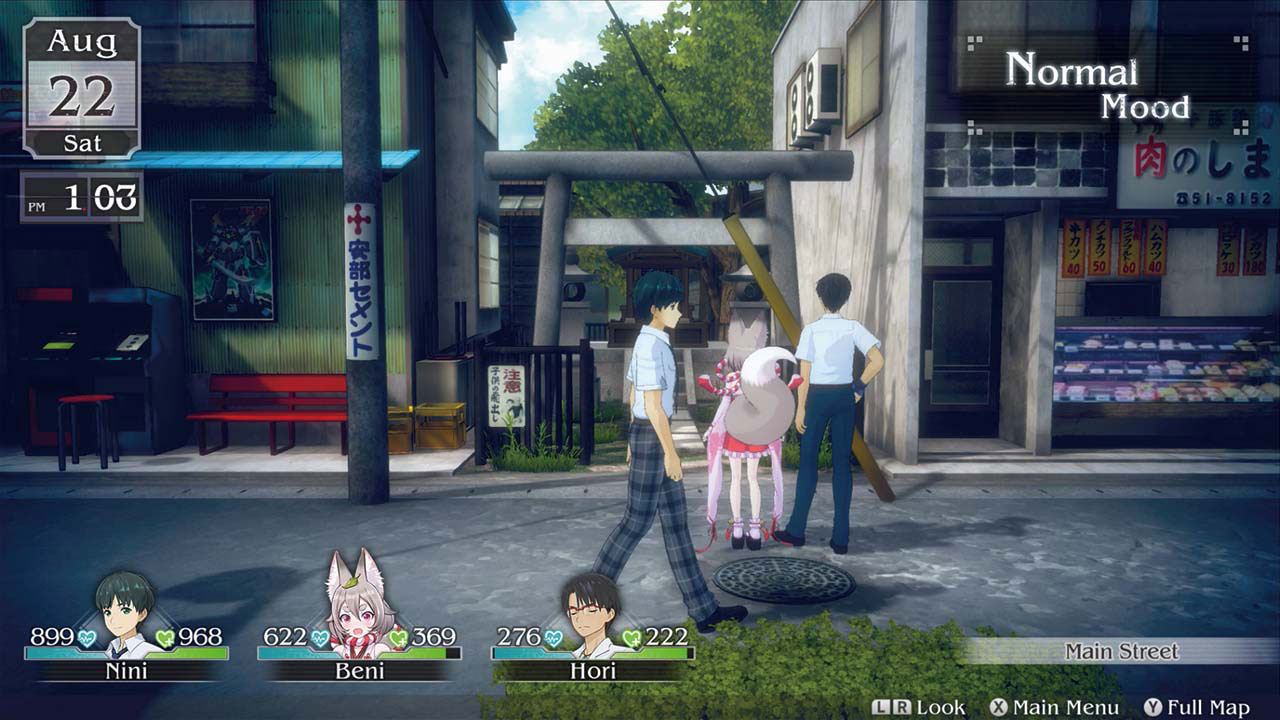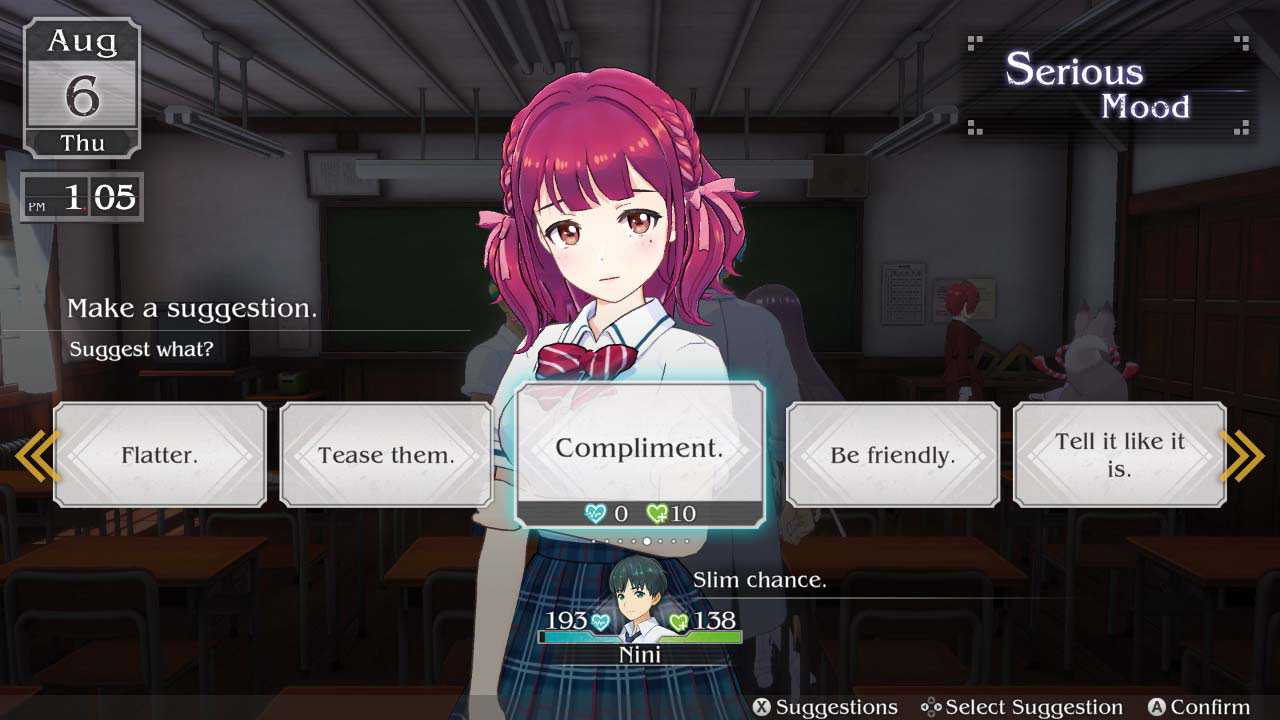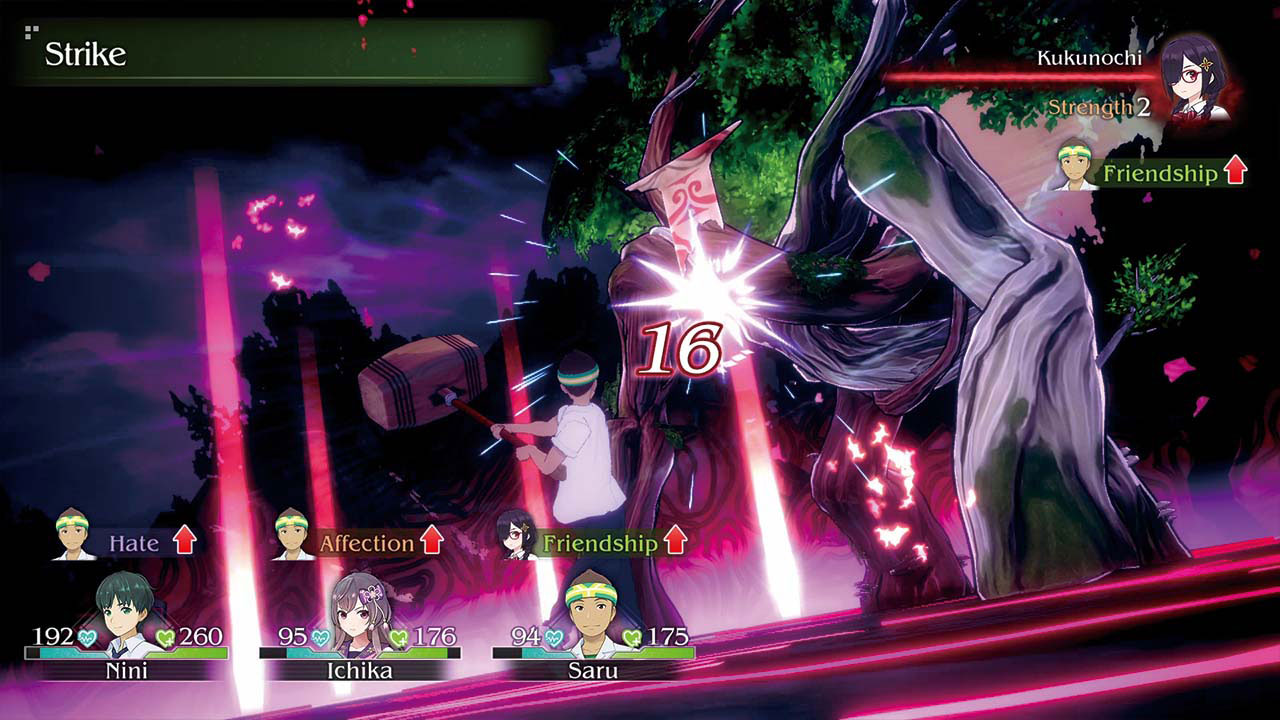[Review] Loop8: Summer of Gods
System: Switch
Release date: June 6, 2023
Developer: Marvelous
Publisher: Marvelous / XSEED
I’ve said in prior publications that the concept of time travel is a fascinating yet very sensitive one, as the topic tends to lend itself to narratives that ultimately have no idea how to go about ending a topic that can take myriad of forms and paths, leaving a story open-ended and potentially with too many plot holes because of a traditionally endless structure. Even with limitless routes comes limitations, however, Loop8: Summer of Gods, despite all its positives, is yet another victim of a time loop sci-fi snafu that has its heart in the right place, but any potential excellence in a different timeline.
The setting of Loop8: Summer of Gods takes place in the early 1980s in the fictional town of Ashihara, Japan, and it’s this particular time period that I find stunning to travel back to and experience as there was this sense of being more connected with the outside world and nature that also brings with it wonderful solitude and a beautiful innocence. Games like Attack of the Friday Monsters!: A Tokyo Tale, Fatal Frame, and Shenmue, for example, do a fantastic job at encapsulating the era, and this one joins them in providing that feeling of authenticity and nostalgia despite its fictional setting and sci-fi elements that detail some of its finer parts. The way the art direction combines the two is weaved in such a way that is surprisingly complementary but still grounded in reality even with its supernatural elements – much like The Girl Who Leapt Through Time – and does so in a way that feels believable and organic.
Playing as Nini, the main character, you don’t really question the fact that he came from space and is adjusting to life on Earth, or the fact that he has a power known as Demon Sight to help eradicate the Kegai, an invasion of demons that will obliterate the planet. It all feels so natural as it’s intertwined with your basic slice-of-life activities such as attending class and getting lunch, so Loop8 from the start does a great job with its immersion solely from a visual perspective.
Loop8 has a lot going for it that makes it a great game conceptually from the ground-up, and this should be immediately noticeable for players as they get introduced to such a great cast of characters that all feel unique and in-depth. Building relationships amongst them is also crucial to how parties will perform when going up against the Kegai, and will heavily impact the game’s events and, of course, ending. Just about every character is charismatic in their own way, and this is hugely appreciated as sometimes I feel like large casts and playable characters can actually take back from the enjoyment of a game rather than enhance them. Games like Final Fantasy Type-0 or Operation Abyss that find themselves in similar situations (attending class; end of the world; a threatening invasion) have way too many characters and combinations for their own good, and this can make a game feel bloated and, quite frankly, make parties feel nonsensical as so many characters end up doing the same thing or there are just too many type match-ups that bring with it endless grind that takes away from a more seamless experience and meaningful sense of progression. Loop8, thankfully, is more along the lines of, say, Xenoblade (not as much Persona as one would think) in that you have enough flexibility with just enough characters to play around with and no matter which few you choose to bring along into battle, chances are you’re in for a good time.
Because relationships are so important, those bonds will ultimately tie into how your stats grow and how it’ll affect your performance in and out of battle. When speaking among characters on Nini’s downtime across the various sections of its map which are all contained in their own hub rather than being open-world, certain prompts to initiate certain activities will come up, and depending on the selection, a corresponding mood will cause stat increases typically for both the player character and the one they’ve spoken to. Prompts like “Let’s Take A Walk”, “Get To Know You Better”, or even “Tease” can cause a variety of reactions depending on the character, time of day, and bond, and these can either increase or decrease a stat depending on the mood affected. Though I found myself rather liking this system of building characters over continuous grind – which gives the title that sense of solitude during slice-of-life moments of gameplay before going up against Kegai – the issue came from its main gimmick that drives Loop8’s narrative and core gameplay loop: a reset.
In an almost Majora’s Mask style, Loop8 goes through the month of August where Nini has to keep the Kegai from devastating the planet. Days start out at 6AM once you wake up from resting, and each passing second equates to a minute of in-game time. With a day/night cycle, multiple ways to train via talking, working out, studying, and completing various tasks passively (like simply interacting with shrines and objects) or completing side-quests, Nini has a lot going on for him as he adjusts to his time on Earth and sudden calling to protect the world, and this only grows as the days and story continue along. That said, when a reset occurs, all your hard work becomes wiped, though the player is able to quickly reclaim the progression that was made by going about the same events again. Having to do that process over and over, however, ends up feeling redundant and ultimately like a waste of time when the story keeps teasing and provoking the player to move forward. It’s this constant stop-go motion that almost feels like being stuck in traffic, and it’s immensely frustrating and unfortunately takes away from an experience that is otherwise full of potential.
Emotions and bonds play such a huge part in Loop8’s premise that they come into play in battles as well. Fighting against the Kegai with any party members you bring along doesn’t just include the traditional basic and magic attacks one would see in a standard RPG, but instead replace all of those prompts and functionalities with emotion-based skills. Utilizing methods that typically categorize themselves under friendliness, admiration, or anger will yield damage that varies with how each is used alongside each party member as well as its frequency. It’s an odd and sometimes cumbersome way to simply do damage, with some turns that can strategically be taken advantage of by complimenting a member or protecting them, but I couldn’t help appreciating that at least an attempt to make a battle system somewhat different was attempted here instead of going for the norm. Not much explanation is given surrounding these mechanics once the game begins and you’re in the early hours of the game, so a lot of it will be through trial and error, which is probably intentional anyways given the looping system that will inevitably have you try over and over again. A big appreciation towards the battles for myself, though, was that the camera work was rather excellent as it has a dynamic and cinematic feeling, swinging around the field, members, and more with smart cuts to animations – as if Pokemon Stadium was hyper-polished and made to feel like a televised event.
After 25 hours with Loop8’s story, it leaves a lot to be desired, and it once again serves as a reminder that time travel is such a dangerous topic to play with if not executed correctly. I think with the idea of being able to control or manipulate time comes this creative overdose of what’s possible, but it’s the restrictions and limitations that should be seen as a strength to enhance clever ideas rather than seen as an inconvenience. Games like Steins;Gate, Life Is Strange, and Radiant Historia wonderfully handle their time travel mechanics and narratives because they’re structured and use them as a way to experience a “what if?” side story and chance to witness a scenario from a slightly different perspective and rewards the player for doing so, but Loop8 is a little too free and loose that none of it is particularly worthwhile and, frankly, does it a disservice.
Everything about the game is great except for the game itself, and it’s a sad realization when there are moments of fun that really make Loop8: Summer of Gods feel special and soothing. It truthfully feels more as if it was meant to be an anime or choose-your-own-adventure experience instead, but somehow found itself turning into a JRPG by accident. Hints of Steins;Gate, 13 Sentinels: Aegis Rim, and the film Fireworks can all be felt in some capacity, and it makes me believe once more that the game had good intentions, concepts, and goals heading into it, but was a project that eventually stagnated and reached a point of “let’s just get this finished” prior to shipping. With time looping being such a prominent part of the structure, it unfortunately didn’t accommodate for the amount of times that it would potentially be done for the player, with a huge lack of variation for dialogue and foregoing any meaningful progress or actions that can make each loop feel unique and interesting rather than mundane, shallow, and tedious.
The Verdict
Loop8: Summer of Gods is a beautiful game that really channels the 1980s of Japan in a special way, but for all it does visually and mechanically, the core gameplay itself feels misguided and ultimately will have most players feeling like they’ve had enough after so many loops. Its repetition – despite its narrative relevance – boggles it down in a way that can quite frankly ruin the summer for a player, and having to do the same thing over and over again, having the same conversations, and accomplishing the same tasks (though stats get back to where they were quicker each time) with limited progression on each reset of the world (à la Majora’s Mask) can make the experience feel like a roguelite in disguise – though not one that entices one more playthrough. As a JRPG, however, it’s a fantastic vision that handles its battles in a simultaneously unique and familiar way that it’s some of the most engaging I’ve witnessed in some time from standard turn-based combat. I only wish Loop8 had more focus on what it wanted to accomplish and handled the loops and resets in a more methodical way rather than its loose and compromised approach.
Loop8: Summer of Gods copy provided by the publisher for the purposes of this review.




